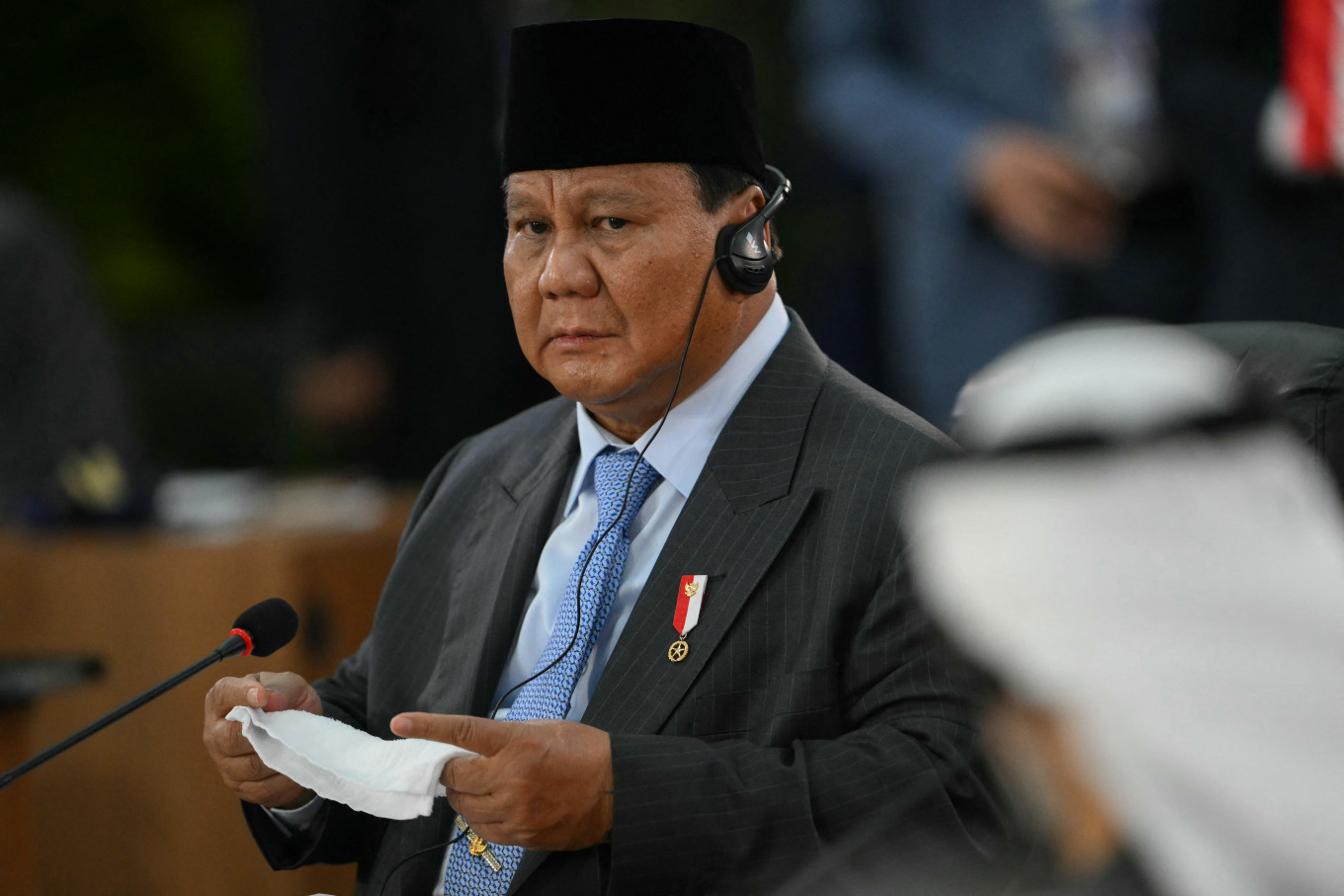Popular Reads
Top Results
Can't find what you're looking for?
View all search resultsPopular Reads
Top Results
Can't find what you're looking for?
View all search resultsHow Prabowo is rewriting Indonesia’s diplomatic playbook
With 26 overseas visits in nine months, Prabowo is betting big on face-to-face diplomacy.
Change text size
Gift Premium Articles
to Anyone
U
nder President Prabowo Subianto, Indonesian diplomacy has taken a distinctive turn. Rather than relying solely on his foreign ministry, Prabowo has been personally performing diplomatic roles on the international stage. In the nine months since his inauguration, he has visited 26 countries for bilateral and multilateral meetings.
This practice of diplomacy at the highest level is known as summit diplomacy. It involves heads of state or government engaging directly with their counterparts to negotiate, build trust or assert national interests.
Summit diplomacy is not new or uncommon in international relations. Historically, summit diplomacy often reflects the urgency or gravity of the issues at hand, topics such as war and peace, nuclear disarmament or the founding of new global institutions.
In more recent decades, however, summit diplomacy has broadened in scope. It is no longer confined to issues of high politics. Instead, it is increasingly used to advance economic, technological and regional agendas. Prabowo’s approach fits within this trend, though his intensity and frequency of engagement mark a significant shift in Indonesia’s diplomatic posture.
His preference for summit diplomacy may also reflect a key pledge, made during his presidential campaign, to raise Indonesia’s global stature and expand its influence.
A president’s personal involvement often attracts media attention and international recognition. More importantly, direct dialogue can build stronger bilateral ties and demonstrate Indonesia’s commitment to multilateral frameworks.
Prabowo, who was earlier defense minister, began his engagement with foreign affairs even before his inauguration as president by visiting 15 countries. At the 2023 Shangri-La Dialogue in Singapore, he sparked controversy with his proposal to end the war between Russia and Ukraine. Prabowo floated the idea of a demilitarized zone between Russia and Ukraine and a United Nations referendum in what he called disputed territory without consulting or informing his colleagues at the Foreign Ministry or the president.
His summit diplomacy as president has drawn praise from some quarters. His state visits to Saudi Arabia, Brazil and various European countries have been described as highly productive. Indonesia’s recent accession to the BRICS grouping of countries and his attendance at the 2025 BRICS Summit in Rio de Janeiro signaled Indonesia’s deeper alignment with emerging global powers.
A tangible outcome of Prabowo’s summit diplomacy was the political agreement with European Commission President Ursula von der Leyen, which advanced the stalled Indonesia-European Union Comprehensive Economic Partnership Agreement.
Similarly, Prabowo’s direct phone diplomacy with United States President Donald Trump led to a breakthrough trade deal: the reduction of US import tariffs on Indonesian goods from 32 percent to 19 percent. As a result, Indonesia now enjoys the lowest tariff rate of any Southeast Asian country trading with the US.
But summit diplomacy is not without its detractors. While it can help build partnerships or resolve crises, there are also instances where it has produced limited or even counterproductive outcomes.
One such example is the 2018 meeting between Trump and North Korean leader Kim Jong-un in Singapore. Hailed initially as a diplomatic breakthrough, the summit ended without a formal agreement and failed to halt North Korea’s weapons program. Within months, tensions between the two countries had returned.
The appeal of summit diplomacy lies in personal contact. When leaders meet face to face, they can cut through bureaucratic inertia and establish rapport that formal channels may struggle to achieve. However, diplomacy conducted without sufficient institutional backing or consultation can lead to missteps.
In Prabowo’s case, his meeting with Chinese President Xi Jinping in November 2024 has generated controversy. The joint development agreement signed between the two leaders in disputed maritime areas was criticized for overlooking the sensitivities of Indonesia’s ASEAN neighbors. Analysts warned that the move could heighten tensions in the already volatile South China Sea.
Prabowo was also seen as making another blunder with his plan to evacuate 1,000 Palestinians from Gaza. To support his plan, Prabowo traveled to the five key countries on the Palestinian issue: the United Arab Emirates (UAE), Turkey, Egypt, Qatar and Jordan. However, the plan did not resonate positively at home. At the same time, the major Arab countries have made it very clear that they reject any relocation plans for Palestinians out of their territories in Gaza and the occupied West Bank.
These illustrate a broader concern: summit diplomacy, while useful for signalling intent and building momentum, often lacks the institutional depth needed for durable policy outcomes. Many high-profile summits conclude with joint declarations but no clear mechanisms for follow-up implementation.
To be effective, summit diplomacy needs to be integrated into a broader institutional framework. Institutionalization helps ensure that agreements are not only negotiated but also monitored, executed and evaluated. This is especially true in multilateral settings, where complex coordination is required.
Indonesia’s hosting of the G20 Summit in 2022 offers a model of institutionalized summit diplomacy. Despite deep global divisions at the time over the war in Ukraine, rising inflation and economic instability, the G20 produced a joint communiqué. Much of the credit went to the preparatory work done by sherpas, the senior government officials who engaged in months of negotiations to craft language acceptable to all sides. Without this groundwork, the summit might have ended in deadlock.
As Indonesia under Prabowo pursues a more assertive foreign policy, summit diplomacy will likely remain a key instrument. However, to avoid the pitfalls of over-personalization, it must be supported by sustained institutional engagement, regional coordination and clear implementation strategies.
---
The writer is an international relations lecturer at Gadjah Mada University and a researcher at the Institute of International Studies, International Campaign to Abolish Nuclear Weapons (ICAN) Partner. The article is republished under a Creative Commons license.











